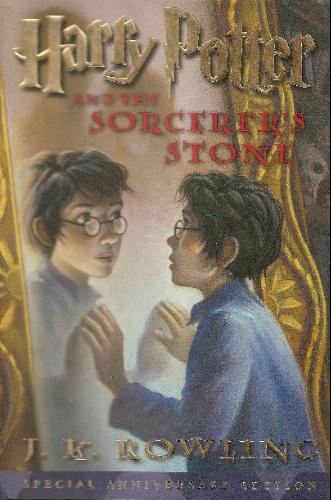
Maybe it’s the music. It must be the music. The quiet, high notes; the accidentals; then it swells, and our emotions with it. John Williams created a score that sends goosebumps down the spines of millions of children worldwide.
It’s difficult to describe the magic of Harry Potter to non-Potterheads, but the story for most of my generation goes like this: we latched on at some point before book four and became engrossed. Here was this boy, awkward and teased and unhappy, who was whisked away to a magical world where anything was possible and he was famous. Suddenly he had skills and friends and mentors, power and meaning and a future. True, the early books were childish, but when we first read them, we were too.
As we grew, so did the characters (and the storytelling). Harry got into fights with old friends, had his first crush, his first kiss, and so did we. He learned hard lessons about death and friendship and responsibility right about at the same time as we did. His quest became a kind of parallel to our own adolesence.
Though the story really came to an end on July 21, 2007, for many fans, the franchise lived on. It was over, but there was still more Harry Potter to look forward to, in a way. David Yates’ vision of the Potter books was excellent, and added new levels to the stories, and brought something unforgettable and fresh to the scenes we knew so well. The lighthearted dance sequence in Deathly Hallows Part 1 was never in the novels, but it added a depth to Harry and Hermione’s friendship that some fans always felt was lacking on the page. Similarly, Yates captured the story of Snape’s devotion to Lily with a few short vignettes, proving just as effective as Rowling. Maybe he even did it better: watching Snape enter the Potter household in the pensive memory was one of the most emotionally intense scenes in a very emotionally intense movie. Sometimes a picture really is worth a thousand words.
Until last night, there was always more Harry Potter magic to look forward to. Now, there is not. While the still-vague Pottermore looms on the horizon, the final film definitely felt like the ending of the Potterverse.
It sounds somewhat loaded to call it the end of our childhoods, as many in my generation have. But since we grew up with Harry, and Harry really grew up in Deathly Hallows, I wouldn’t call it too much of an exaggeration.
In the final novel, Harry takes a journey that every young adults takes, and one that many of my fellow students (or recent graduates) are taking right now. We’re not on a pages-long camping trip, and I doubt many of the Quad readers are fighting a secret battle to destroy and much-partitioned soul of an evil overlord. But the most difficult part of Harry’s quest is one to which we can all relate: his deeper understanding of Dumbledore.
Throughout the first six books, Harry sees Dumbledore as a sort of omniscient, omnipotent demigod, an all-good protector against the dark forces who want him dead. And while Dumbledore tries to protect him, he cannot. He is killed, and this is an unspeakable tragedy for Harry. In Half-Blood Prince, he learns that all people are mortal, even the ones he had somehow always considered to have transcended death.
But in Deathly Hallows, the lesson Harry learns is even harder: Dumbledore was not perfect. Dumbledore was never perfect. With a heavy heart and a guilty conscience, his mentor had been training the boy to sacrifice himself. Dumbledore had lied and deceived and, as Rita Skeeter and Aberforth’s stories reveal in the books, he had made many mistakes in the past.
No one is mortal, and no one is without flaw. The people we idolize and idealize have faults. Even when they are looking out for our best intentions, they can screw us over. Royally. By the end of the final book, Harry recognizes it, but he doesn’t fault Dumbledore for it.
It’s difficult to learn the vulnerability and imperfection of your own parents or grandparents or people you rely the most on, and even more difficult to forgive them for it. In The Sorcerer’s Stone,when Harry is eleven, he sees Dumbledore as a sort of deus ex machina who could intervene at the last minute to save the day (or at least send his trusty phoenix to do it). Part of becoming an adult is realizing that that sort of power is fictional, magic or no magic.
Harry Potter is all grown up, and so are we.
Our generation has put a lot of stock in a relatively simple tale of good and evil, but like Aesop’s fables or the parables of Jesus, it tells an important story in a format that’s readable, entertaining and applicable.
So yes, Harry Potter is fictional. Hogwarts is not real, and the agencies taking care of our money look a lot less like goblins and dragons than we might wish. But it has and will continue to exist, potently, in our imaginations, which might be as vivid and important as anything that exists in the real world.
I’ll let J. K. Rowling explain it, because she explained what Harry Potter means to my generation quite aptly in Harry Potter and the Deathly Hallows at the end of Chapter 35, “King’s Cross.”
“Tell me one last thing,” said Harry. “Is this real? Or has this been happening inside my head?”
Dumbledore beamed at him, and his voice sounded loud and strong in Harry’s ears even though the bright mist was descending again, obscuring his figure.
“‘Of course it is happening inside your head, Harry, but why on earth should that mean that it is not real?”

